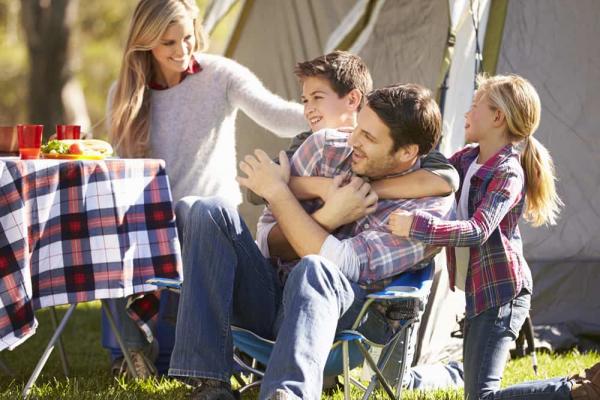
Camping can be a great way to get some downtime, enjoy nature and bond with friends and family, but not being prepared can make your trip frustrating and stressful. Here are 10 tips that will make your trip run smoothly.
1. Make a list of things you need and give yourself plenty of time to gather them.
Making the list a few days prior to your trip gives you time to get laundry done and go shopping so everything is ready to be packed.
2. Research your campsite ahead of time.
Know if your camp requires reservations. If you don't need reservations, know what time to get there in order to find a good place to set up camp. What kind of access will you have to clean water? Does the camp have bathroom facilities and what do those facilities include? Remember to bring extra toilet paper and a five gallon cooler of water.
3. Give yourself enough time to pack.
Remember that, unlike other vacations, camping requires you to bring everything with you. You can't call room service for towels or soap or garbage sacks. Not only do you need to bring everything with you, but chances are you won't have a store nearby where you can pick up the things that you forgot. Giving yourself time to pack will help you leave in good time so you won't be setting up camp in the dark.
4. Leave early.
It's difficult to find a campsite when you get there late not only because it's dark but because many of the campsites will already be taken. It's also difficult to set up a tent, unpack, arrange bedding and put on dinner if you can't see what you're doing. This can be especially frustrating if you have young children who are tired and hungry. Getting there early will not only help you get your children fed and ready for bed but will also give them time to explore before settling down.
5. Have a simple plan before you get out of your car.
The first few hours of camping can often be the busiest and the most stressful. However, if everyone knows what is expected of them once they step out of the car, the set up can go quickly and smoothly. If you have young children, it will help if you have little activities they can do while you are setting up camp. A coloring book, a Frisbee, or a juice box can make all the difference. Assigning responsible older children to watch over the younger ones will also help.
6. Be thoughtful of others around you and understand basic camp etiquette.
Be friendly with those that are camping near you. Bring your own firewood, and don't walk through other people's campsites. Teach children to be respectful and polite.
7. Make sure you bring enough warm clothing and sleeping bags.
It often gets cold up in the mountains especially after dark. Bring plenty of layers. A dry pair of socks, decent boots, or a sweatshirt can make all the difference.
8. Keep food away from animals.
Know what critters might frequent your campsite. Keep all food locked in your car or in bear boxes provided at your camp. Animals will get into anything that has a scent so make sure to lock up things such as toothpaste, deodorant, and sunscreen.
9. Have some good campfire stories ready to share.
The campfire is the perfect place to share a good joke, a scary story, or a family memory. Encourage others to share stories too. These experiences can be bonding and
research showsthat sharing family memories increases our children's resilience.
10. Have a good clean-up plan.
Remember the scouter's plea to Leave No Trace
Give out assignments to your campers so that you can get out quickly. You will know if your trip was a success if everyone still wants to stay. Here are some camping rules that carry over into life.
List of things commonly forgotten:
- Hats
- Sunscreen
- Bug Spray
- Eating Utensils such as spoons and fork
- Cooking utensils, especially cutting knives and serving spoons
- Firewood
- Medications. Always a good idea to include some allergy medication
- Marshmallow or hot dog roasters
- Five gallon cooler full of water
- Trash bags
- Napkins and other paper goods
- Hand sanitizer
- Pillows
- Glove for getting food out of the fire
- Can opener, if you have canned foods
- Toilet Paper
- First aid Kit
- Soap
- Towels
- Wet wipes
- Dry socks
- Decent boots or shoes
- Layers such as sweatshirts and jackets
- Creams and lotions
- Long pants
For a complete list, go to REI.

